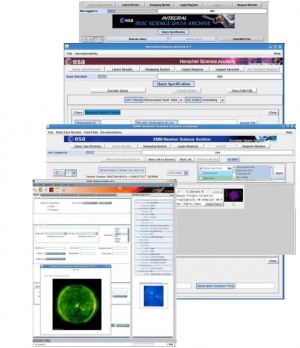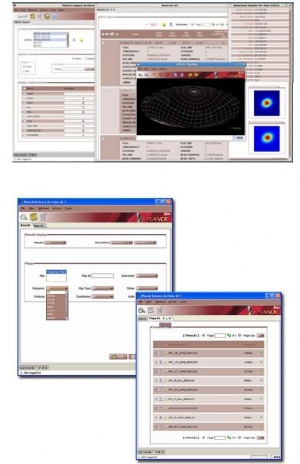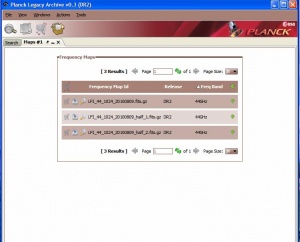Difference between revisions of "PLA quick start guide"
(Created page with '==PLA quick start guide== ===Introduction=== The Planck Legacy Archive (PLA) contains all public products originating from the Planck mission. A graphical user interface accessi…') |
|||
| Line 110: | Line 110: | ||
The PLA Helpdesk consists of the three scientists of Planck Science Office. For some questions related to data products and instruments, the questions may be re-directed to data-processing or instrument specialists in science institutes of the Planck Ground Segment. | The PLA Helpdesk consists of the three scientists of Planck Science Office. For some questions related to data products and instruments, the questions may be re-directed to data-processing or instrument specialists in science institutes of the Planck Ground Segment. | ||
| − | In order to send a request to the Helpdesk, please fill in the form at | + | In order to send a request to the Helpdesk, please fill in the form at the |
| − | + | [http://www.sciops.esa.int/helpdesk_pia Helpdesk] | |
("Submit a ticket") | ("Submit a ticket") | ||
Revision as of 13:05, 3 July 2014
Contents
PLA quick start guide[edit]
Introduction[edit]
The Planck Legacy Archive (PLA) contains all public products originating from the Planck mission. A graphical user interface accessible from this page allows to list, display, inspect, select, and download these products.
The first public product present in the Planck Legacy Archive was the Early-Release Compact Source Catalogue (ERCSC) released in January 2011.
As of January 2013, the PLA contains all temperature maps per Planck frequency, as well as ancillary maps like Survey maps, detector maps, etc. It also contains the first public version of the Planck Catalogue of Compact Sources and information about the spacecraft, instrument and survey history, notably through all the operational files and the Planck Operations State History (POSH).
Purpose[edit]
The PLA will mainly serve the needs of professional astrophysicists wishing to carry out astronomical research, related to various astronomy fields as the Cosmic Microwave Background, extragalactic astronomy, Galactic interstellar medium, and Solar System studies, among others. In addition to these professional users, a number of others will be browsing the PLA, including members of the general public and members of the press. In both cases, they will be looking for general information on the Planck satellite and its scientific results, news about Planck, pictures and other public-relations material, among other things.
Contents[edit]
The Planck Legacy Archive contains the following classes of products as of January 2013:
- frequency maps at all nine frequencies of Planck (in temperature only)
- sky component maps per frequency per component
- various ancillary maps like survey maps, detector maps, detector set maps, etc
- the first version of the Planck Legacy Catalogue of Compact Sources
- the Early-Release Compact Source Catalogue (since January 11th, 2011)
- operational files for the first six surveys (approximately first three years of Planck routine operations): pointing lists (programmed and achieved), orbit information, data-quality reports, instrument health reports, etc)
- the Planck Operational State History (POSH) - the "state vector" of the Planck mission
- documents associated to the above products
In addition to these public products, the same archive has an internal part (Planck Internal Archive or PIA) containing products restricted to the Planck collaboration.
Software[edit]
The data browsing and retrieval from the PLA interface involves the following actions:
- there are several search panels or tabs (Maps, Catalogues, Time-Ordered Information, Documents...) which offer a set of filters to set the search criteria for the data queries
- after executing a query, a new result panel is automatically created with the result contents
- each result tab contains a list of the data which match the specified query. From this page several operations can be performed, depending on the type of data to be retrieved (e.g. display a set of sources, save result tables as XML or CSV, send them to another application, download the products, etc).
Some products require authentication (only those pertaining to the Planck Internal Archive, restricted to some people in the Planck Collaboration). The user must enter their username and password (Planck LDAP credentials) in the login window. If authorisation is granted, the status bar in the left bottom corner of the application window will be updated to the current user's ID and login time.
A general set of help pages is present on the Java interface. Please refer to these pages for further explanations on the software.
Access[edit]
The PLA main page can be accessed here [1].
The Java interface can also be directly launched from here [2].
Trouble shooting for the PLA Java client[edit]
To run the PLA your web browser must be Java compliant (Java version 1.5.x or higher is required for running the PLA), if not please install the latest Java following the instructions provided here [3].
In case of problem, and to make sure that you are using the latest version of our software, please clean your Java Web Start cache (see below) and run the application again. If the problem persists, please open a web browser (Internet Explorer, Mozilla Firefox, Safari, ...) and send us the output from this page [4] (which lists your configuration) along with the description of your problem. If the problem is related to data searching, it will be very helpful if you include the contents of your Log Console, which you'll find at the bottom of the ERCSC window, when you contact us (see Helpdesk section).
How to clean your Java Web Start cache on Windows systems:
- Click on the "Start" icon in the lower left hand corner of your screen, followed by clicking on the "Run" menu choice.
- In the run box, type "javaws -viewer" (w/o the quotes) and hit "Enter".
- Select all the entries and then click on the "Remove Selected Applications/Items/Entries" button/icon.
On Linux systems:
- Find out what version of Java you are running by and typing in "java -version" at the command line (w/o the quotes).
- Type in the command "$JAVA_HOME/jre/javaws/javaws" or "$JAVA_HOME/jre/javaws/javaws -viewer" on the command line if your Java version is 1.5 or 1.6 respectively.
- Select all the entries and then click on the "Remove Selected Applications/Items/Entries" button/icon.
On Mac OS X systems:
- Find out what version of Java you are using by running "Applications/Utilities/Terminal" and typing in "java -version" at the command line (w/o the quotes).
- Type in the command "javaws" or "javaws -viewer" on the command line if your Java version is 1.5 or 1.6 respectively.
- Select all the entries and then click on the "Remove Selected Applications/Items/Entries" button/icon.
On Windows systems, in case of trouble with Java WebStart and Comodo Firewall:
- When trying to launch the archive interface, Java WebStart may return the error “splash recv failed”.
- Possible solution: Add Java WebStart to the list of authorized applications in the Comodo Firewall.
Planck Legacy Archive Helpdesk[edit]
The PLA Helpdesk consists of the three scientists of Planck Science Office. For some questions related to data products and instruments, the questions may be re-directed to data-processing or instrument specialists in science institutes of the Planck Ground Segment.
In order to send a request to the Helpdesk, please fill in the form at the Helpdesk
("Submit a ticket")
Planck Legacy Archive
Early Release Compact Source Catalog
Planck Internal Archive


